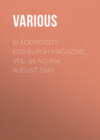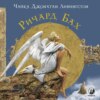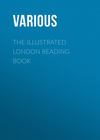Читать книгу: «Blackwood's Edinburgh Magazine, Vol. 66 No.406, August 1849», страница 17
NORTH.
I believe that, though darkness lies round and about us seeking to solve such questions, a feeling of deep satisfaction in witnessing the adherence to Moral Rectitude, and of deep pain in witnessing the departure from it, are the necessary results of a moral sensibility; but taken in their elementary simplicity, they have, I think, a character distinct from those many other emotions which will necessarily blend with them, in the heart of one human being looking upon the actions of another – "because that we have all one human heart."
TALBOYS.
Who can doubt that Religion infuses power and exaltation into the Arts? The bare History teaches this. In Greece Poetry sang of Gods, and of Heroes, in whose transactions Gods moved. Sculpture moulded Forms which were attempted expressions of Divine Attributes. Architecture constructed Temples. De facto the Grecian Arts rose out of Religion. And were not the same Arts, of revived Italy, religious?
BULLER.
They all require for their foundation and support a great pervading sympathy – some Feeling that holds a whole national breast. This is needed to munificently defraying the Costlier Arts – no base consideration at bottom. For it is a life-bond of this life, that is freely dropped, when men freely and generously contribute their means to the honour of Religion. There is a sentiment in opening your purse.
SEWARD.
Yes, Buller – without that sentiment, no man can love noble Art. The true, deep, grand support of Genius is the confidence of universal sympathy. Homer sings because Greece listens. Phidias pours out his soul over marble, gold, and ivory, because he knows that at Olympia united Greece will wonder and will worship. Think how Poet is dumb and Sculptor lame, who foreknows that what he would sing, what he would carve, will neither be felt nor understood.
BULLER.
The Religion of a people furnishes the sympathy which both pays and applauds.
TALBOYS.
And Religion affords to the Artist in Words or Forms the highest Norms of Thought – sublime, beautiful, solemn – withal the sense of Aspiration – possibly of Inspiration.
NORTH.
And it guards Philosophy – and preserves it, by spiritual influence, from degradation worse than death. The mind is first excited into activity through the impressions made by external objects on the senses. The French metaphysicians – pretending to follow Locke – proceeded to discover in the mind a mere compound of Sensations, and of Ideas drawn from Sensations. Sensations, and Ideas that were the Relics of Sensations – nothing more.
TALBOYS.
And thus, sir, by degrees, the Mind appeared to them to be nothing else than a product of the Body – say rather a state of the Body.
NORTH.
A self-degradation, my friend, which to the utmost removes the mind from God. And this Creed was welcome to those to whom the belief in Him was irksome. That which we see and touch became to such Philosophers the whole of Reality. Deity – the Relation of the Creation to the Creator – the hope of a Futurity beyond the grave – vanished from the Belief of Materialists living in, and by, and to – Sensation.
SEWARD.
And with what a horrid sympathy was the creed welcomed!
NORTH.
Ay, Seward, I who lived nearer the time – perhaps better than you can – know the evil. Not in the schools alone, or in the solitude of philosophical thought, the doctrine of an arid speculation circulated, like a thin and unwholesome blood, through the veins of polite literature; not in the schools alone, but in the gorgeous and gay saloons, where the highly-born, the courtly, and the wealthy, winged the lazy hours with light or dissolute pleasures – there the Philosophy which fettered the soul in the pleasing bands of the Senses, which plucked it back from a feared immortality, which opened a gulf of infinite separation between it and its Maker, was cordially entertained – there it pointed the jest and the jibe. Scepticism a study – the zeal of Unbelief! Principles of false thought appeared suddenly and widely as principles of false passion and of false action. Doubts, difficulties, guesses, fine spinnings of the perverse brain, seized upon the temper of the times – became the springs of public and popular movements – engines of political change. The Venerations of Time were changed into Abominations. A Will strong to overthrow – hostile to Order – anarchical – "intended siege and defiance to Heaven." The irreligious Philosophy of the calmer time now bore its fruits. The Century had prepared the explosion that signalised its close – Impiety was the name of the Giant whom these throes of the convulsed earth had borne into the day, and down together went Throne and Altar – But where are we?
BULLER.
At the river mouth.
NORTH.
What! at home.
BULLER.
See the Tent-Lights – hear the Tent-Music.
NORTH.
Your arm, Talboys – till I disembark. Up to the Mount I shall then climb, unassisted but by the Crutch.





















